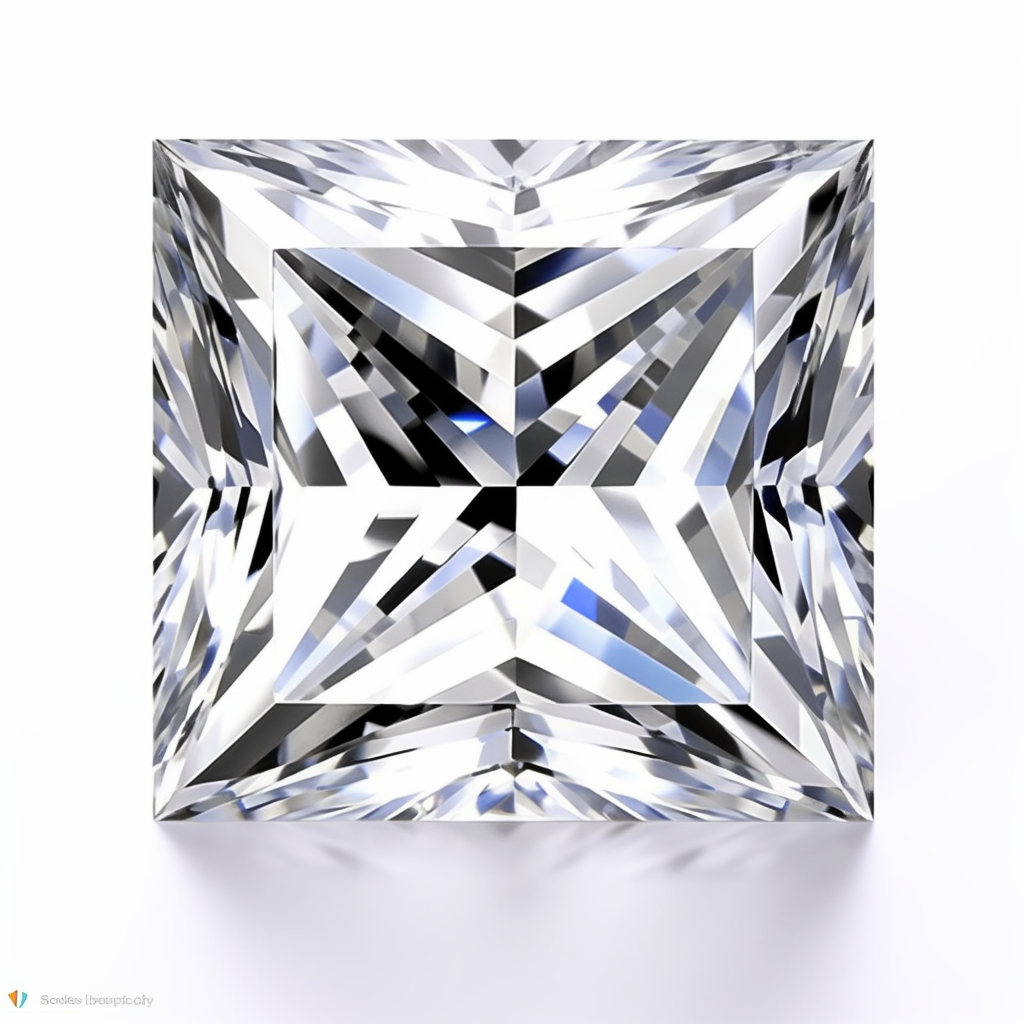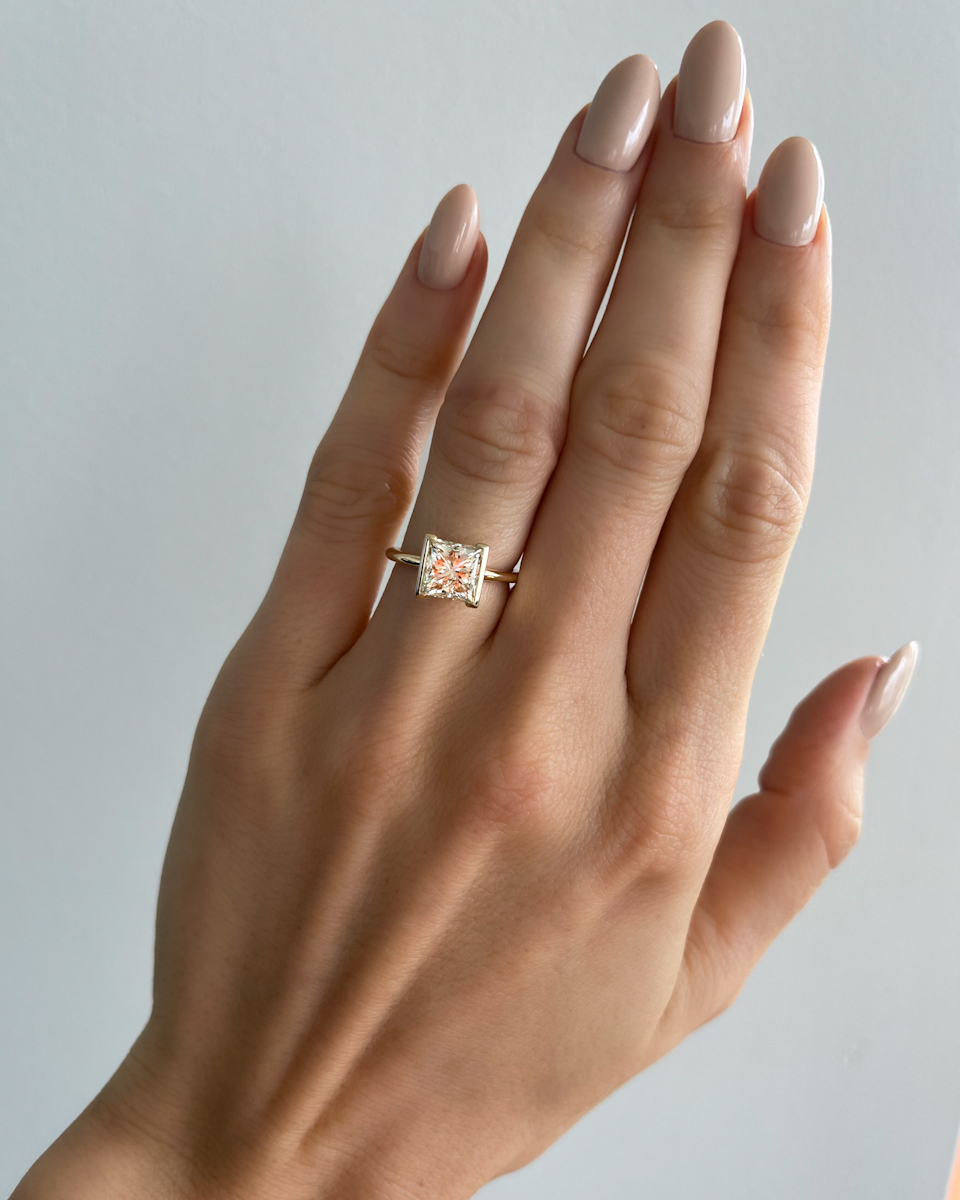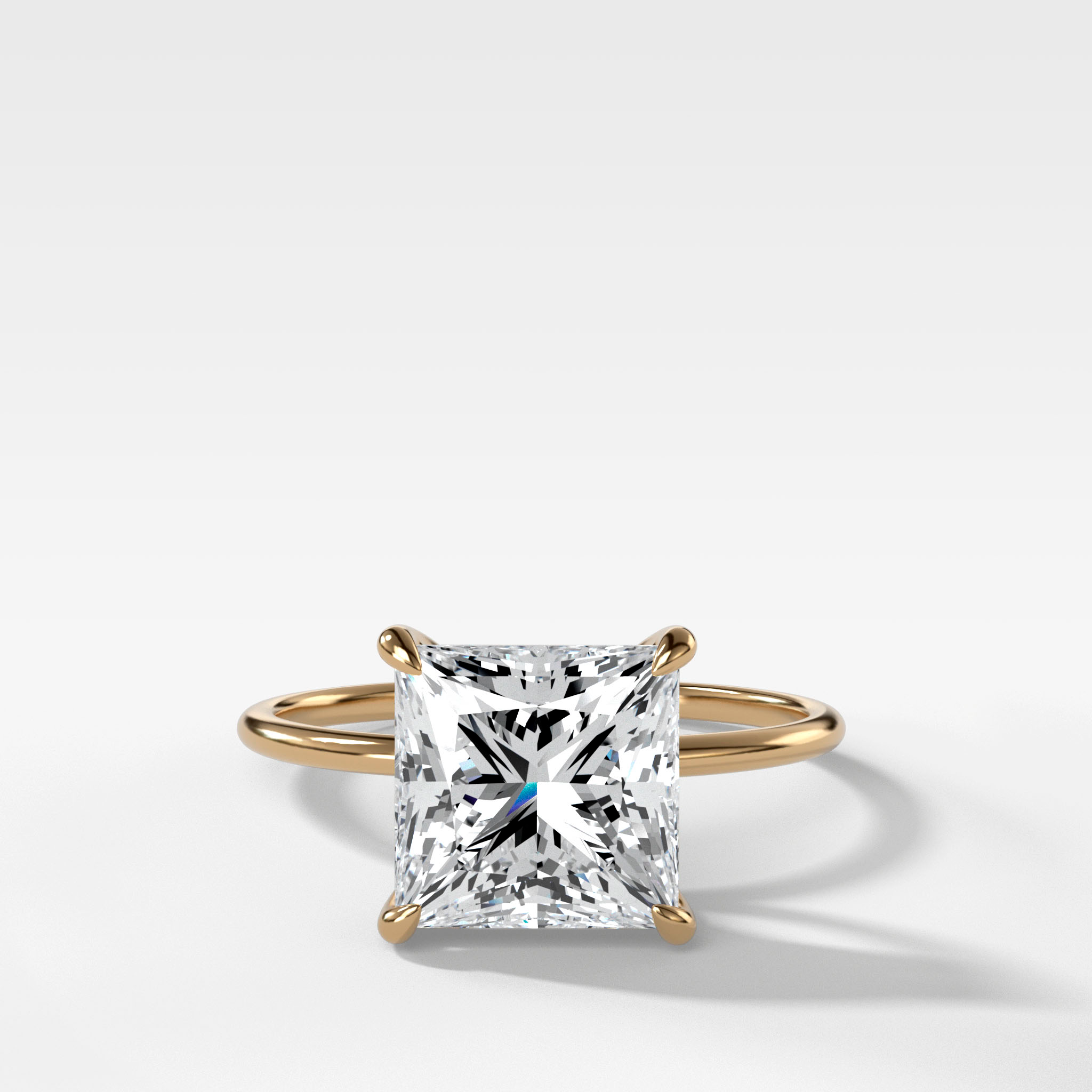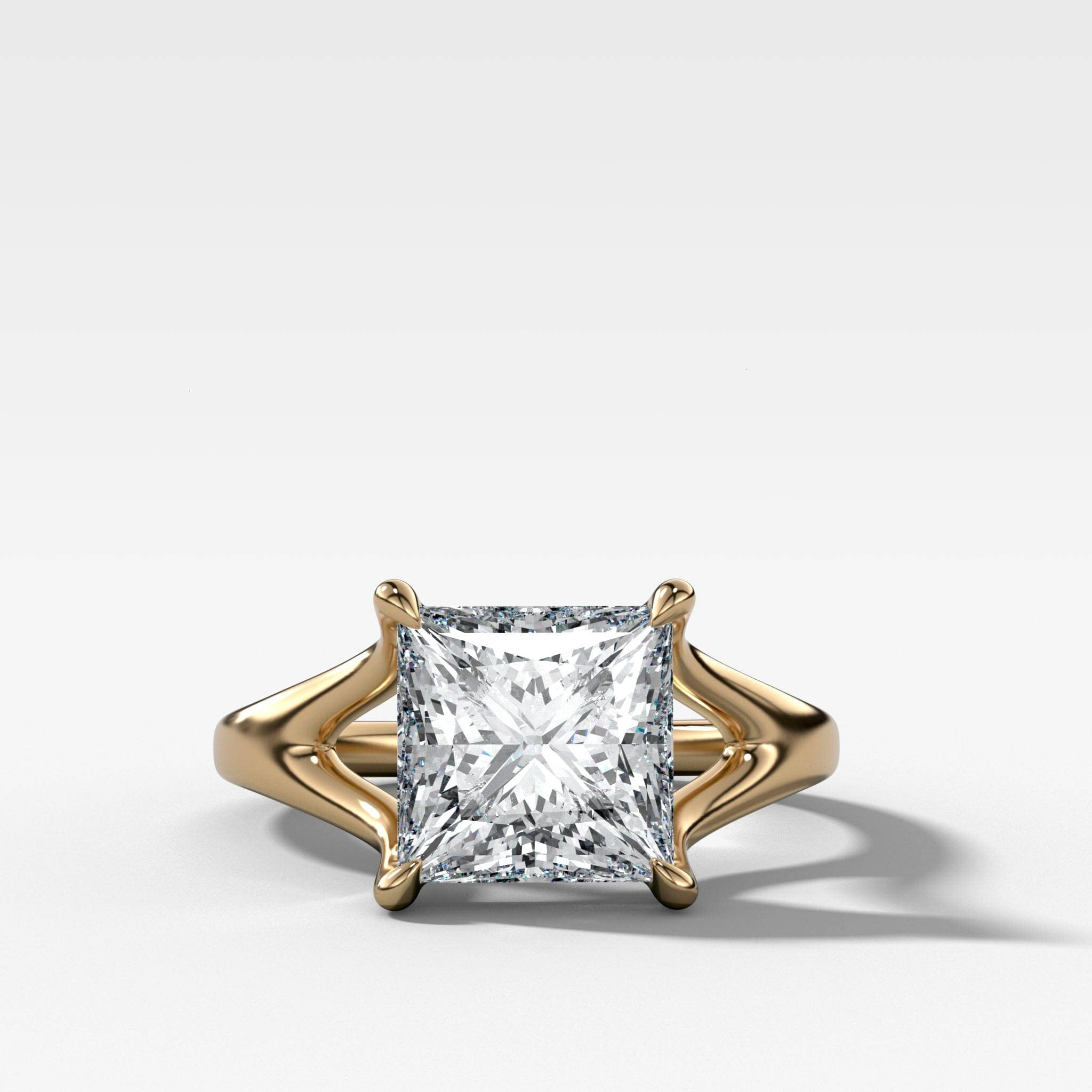Most of us will never be royalty in real life, despite the many films made to suggest the contrary. But what we can all have, if we so choose, is a princess cut diamond engagement ring on our finger. The second most popular diamond shape (round diamonds are the first), this chic, brilliant diamond stands out for its sharp, square outline and pointed corners. The princess cut diamond is truly a marvel of modern technology and taste. But if you're not sure where to start in your engagement ring shopping, we're here to help. Let's break down everything you need to know about princess cut engagement rings so you and your partner can start your love story feeling like diamond pros.
What is a Princess Cut Diamond?
Strong, bold, and a bit of a rebel in the diamond world's traditional heroes, a princess cut's square shape and sharp corners can't be mistaken for another shape. They are a brilliant cut, with triangular radiating facets (if you look at the diamond from the top, you'll see a cross-like shape inside where the facets meet), unlike the square-shaped Asscher cut which is a step cut with long, concentric rectangular facets and cropped corners. While most often they are square, princess cut engagement rings can also be found in a rectangular shape, though they are harder to come by as they are a less popular choice and thus cut less by diamond manufacturers.

Princess cut diamonds are the square versions of a round brilliant diamonds
Shape Showdown: Princess vs. Others
Let's break down the main differences between some other popular diamond cuts:
1. Princess Cut Diamond:
-
Shape: Square or rectangular with pointed corners.
-
Facets: Typically has 57 or 76 facets, creating a brilliant sparkle.
-
Characteristics: Sharp corners and a modern, geometric appearance.
-
Brilliance: Known for its exceptional sparkle and fire.
-
Versatility: Suitable for various ring settings and styles, from classic to contemporary.
2. Radiant Cut Diamond:
-
Shape: Square or rectangular with trimmed corners, similar to emerald cut but with facets for more brilliance.
-
Facets: Usually has 70 facets, combining the elegance of emerald cuts with the brilliance of round cuts.
-
Characteristics: Offers a blend of geometric shape and brilliant sparkle.
-
Brilliance: Known for its vibrant sparkle and distinct facet pattern.
-
Versatility: Versatile like the princess cut, suitable for different ring styles.
3. Asscher Cut Diamond:
-
Shape: Square with trimmed corners, resembling an octagon.
-
Facets: Typically has 58 facets, creating a mesmerizing hall-of-mirrors effect.
-
Characteristics: Known for its step-cut facets and vintage appeal.
-
Brilliance: Exhibits a subtle brilliance with flashes of light rather than intense sparkle.
-
Versatility: Ideal for vintage-inspired or Art Deco settings, offering a unique and sophisticated look.
4. Cushion Cut Diamond:
-
Shape: Square or rectangular with soft sides and rounded corners, resembling a pillow.
-
Facets: Can vary but often has large facets and a chunkier facet pattern.
-
Characteristics: Offers a romantic and vintage-inspired appearance.
-
Brilliance: Known for its soft sparkle and ability to display color dispersion (fire).
-
Versatility: Works well in vintage or halo settings, providing a timeless and elegant look.
While each of these cuts offers unique characteristics and appeal, the main differences lie in their shape, facet pattern, brilliance, and overall aesthetic. Depending on your preferences and style, you can choose the cut that best reflects your personality and desired look for your engagement ring.
Are Princess Cut Diamonds New or Old?
While natural diamonds themselves are billions of years old, their cutting into incredibly brilliant gems worthy of fine jewelry is a much more modern pursuit. And compared to other, older, diamond shapes, the princess cut is a relatively recent addition to the family. It was created in the 1960s, making it a modern and contemporary choice compared to some other diamond cuts with longer histories.
The credit for inventing the princess cut goes to Arpad Nagy, a diamond cutter from London. Nagy introduced this new diamond cut as a way to offer a square or rectangular alternative that retained the brilliance and sparkle of the traditional round brilliant cut.
The princess became a sought-after choice for engagement rings as its popularity grew during the 1980s and 1990s. Its geometric shape and ability to exhibit exceptional fire and brilliance contribute to its lasting appeal. The princess cut's clean lines and modern aesthetics make it well-suited for folks looking for a unique and contemporary design in their diamond jewelry.

GOODSTONE's Half Bezel Solitaire engagement ring wit ha Princess cut diamond
The 4Cs of Princess Cut Diamonds
Cut: Proportions Matter
When it comes to finding yourself a super sparkly diamond, cut is where the magic happens. Why is this? Cut is the most important of the 4Cs, for any diamond shape, because it has the most visual impact on a diamond's beauty and brilliance. A poorly cut diamond will simply appear like a dull rock and yes, you (and everyone else) will be able to see the difference. As princess cuts are known for their brilliant sparkle, their cut quality is crucial. But only round diamonds have industry standard cut grades, so you'll want to look for excellent symmetry and polish along with ideal proportions to ensure your diamond's facets play well with the light, bouncing around and back to your eye in the form of brilliance. Shop for a table percentage around 65-75% and a depth percentage around 65-75%. A well-cut princess will steal the show!
Color: The Rainbow Factor
While diamonds do come in a wide array of rainbow hues, what most of us are talking about when it comes to diamond color are much smaller variations between colorless and near-colorless diamonds. You know, the see-through, clear, sparkly rocks. Color is the second most noticeable of the 4Cs to the naked eye, so you might want to also prioritize this in your diamond search. Princess cuts, while they are certainly sparkle queens, do tend to show a bit more body color than comparably-graded round diamonds due to their depth and overall proportional differences. But unless you're going for a massive rock, it's usually not that noticeable. If you want your diamond to truly appear colorless, shop within the G-H color range and you (not your diamond) will be golden! If you are setting your diamond in yellow gold or prefer a warmer tone to your engagement ring overall, you can go a bit lower and get a subtle shift that really glows.
Clarity: A Flawless Finish
Like doing a bit of detective work, but on a super minuscule scale, diamond clarity is a bit of a mystery to most folks. While you've perhaps heard of plenty of celebrities wearing flawless diamonds, these are exceptionally rare, with a price tag to match. Most of the time, diamonds will have at least some kind of clarity characteristics, aka inclusions, inside of them.
Diamond inclusions aren't anything to be afraid of, though, and most of the time won't ever be noticeable to the average human without magnification. In fact, inclusions can be pretty cool when you think about it. They work a bit like our fingerprints, and no two diamonds will ever be exactly the same inside. Inclusions can help identify a diamond and can even be made of other gem materials like ruby or sapphire. But you want to know what to look for...
Lucky for you shopping for brilliant princess cut engagement rings without visible inclusions is quite easy, as the many sparkly facets of this shape help to disguise clarity pretty well. You can even find eye-clean princess cut diamonds in the SI clarity grades, just get a little look at the diamond in store or with a trusted online exclusive jeweler to ensure that nothing is standing out too much before you purchase.

Thin & Simple Solitaire with a Princess cut in yellow gold

Split Shank Solitaire Engagement ring with a Princess cut
Carat: Size vs. Appearance
While many of you are very focused on carat as the most important of the 4Cs (because size matters), it's actually at the bottom of the list. Why is this? Well, carat is simply a measure of a diamond's physical weight, and while it can be a decent indicator of visual size, it's not a guarantee that the diamond's weight is well distributed and the cut is very brilliant. A well-cut diamond can actually appear larger than a poorly cut diamond of the same carat weight, so we never recommend shopping with carat at the top of your list.
Because of their shape, princess cut diamonds can look a bit smaller than round diamonds of the same carat weight when you glance from the top. It's a bit of an optical illusion. But remember, the 4Cs dance together to create the perfect diamond symphony. It's all about finding that sweet spot where your princess cut shines brightest without burning a hole in your wallet.
Are Princess Cut Diamonds Expensive?
A princess cut might be on your wish list, but making one a reality comes down to several factors that include engagement ring styles, the 4Cs, and of course budget. So are princess cut diamonds expensive? Yes and no. They're usually a bit more affordable than round diamonds, but can be more expensive than other diamond shapes because they are a more popular choice. Princess cuts offer great value because they waste a lot less rough diamond material in the cutting process, which means the savings are passed on to you, the customer.
Ultimately, diamond prices come down to a combination of the 4Cs and demand. Prices can vary widely based on factors like color, clarity, and cut quality. If you're looking for a more budget-friendly option without compromising on style, a princess cut diamond could be a great choice. Always keep in mind the overall quality of the diamond, as this will have a significant impact on its appearance and value.
Diamond Talk: Natural vs. Lab-Grown
You can also consider going for a lab created diamond to save some cash. Lab grown diamonds are chemically and visually identical to natural diamonds but are usually less expensive by nearly half. Plus, they are a more eco-friendly option, benefits which we consider a win-win and responsible choice for everyone.
A lab created diamond, formerly known as a synthetic diamond, is created in a laboratory rather than being formed through natural geological processes deep within the Earth's crust. These diamonds have the same physical, chemical, and optical properties as natural diamonds because they are composed of the same carbon atoms arranged in a crystal lattice structure.
Ultimately, whether you want a lab created diamond depends on your personal preferences, values, and budget. Both natural and lab-grown diamonds have their own benefits, and the choice often comes down to what matters most to you. If ethical considerations, environmental impact, and cost are priorities, a lab-grown diamond might be a great option for you. If you value the historical and geological significance of a natural diamond, then a mined diamond may be more fitting.
Choosing Your Princess Cut Engagement Ring
Now that you know all the details about princess cut diamonds, it's time to talk engagement rings! And there are really so many choices out there, it comes down to personal preference and what you feel best represents your love story. But here are a few of our favorite ways to wear a princess cut stone.
A Striking Solitaire
If you really want to show off your stone shape and keep the metal simple, go for a classic solitaire mounting, which raises the diamond off your finger to catch the light. The most classic of all is a four-prong solitaire engagement ring, but we've updated ours with a barely-there band that makes the diamond appear to float. You can make it your own by choosing your favorite metal from yellow gold, white gold, rose gold, or platinum. Delicate prongs protect the points of your stones and your ring will stand stand the test of time.
If you have a super active lifestyle and want a bit more protection for your diamond, or want to really emphasize its geometric personality, you can opt for a bezel set solitaire engagement ring. While bezel settings are usually assumed to be quite a modern style statement, surrounding a precious gemstone in metal is actually one of the earliest stone setting types and has been around for centuries. The bezel setting completely encircles your diamond with a thin band of the metal type (gold or platinum) that you choose, and can even be accented with milgrain dot details, a diamond halo, or side stone accents.
Adding Some Personality
If you want to keep it to a single center diamond but want a bit more design detail in your engagement ring, compare options like a split shank engagement ring or the half-bezel style. These each change up the design of a solitaire with a bit more focus on the metal details without ever detracting from the diamond itself. Your options really aren't limited!
Diamonds in the Details
Are you the more is more type? That might be a sign that a multi-stone engagement ring is right for you. While adding extra diamonds to any ring setting will drive costs up, often you can go with a slightly smaller center diamond to make up the difference. Princess cut engagement rings can feature a wide variety of side stone options and you don't have to keep them all within the same shape family. However, you can totally do so with a style like this showstopping Triad Half Bezel Engagement Ring that features a center princess cut flanked by two just slightly smaller diamonds to the sides.
For something a bit more subtle, shop for engagement ring styles with smaller accent diamonds. A three-stone ring with tapered baguettes is the uber-classic choice, a very celeb-worthy style indeed. But we love modern takes like our Laurel Engagement Ring that shows off marquise diamonds in a floral-inspired look or our Signature Cluster Engagement Ring that features two groups of round diamonds that frame the center stone of your desired size. The carat weight of the side stones is contingent on the center stone selection, ensuring a beautifully proportioned design for your dream ring.
Now, if you're like us, and you woke up and thought, hey, one row of diamonds just isn't enough sparkle for your engagement ring, you've come to the right place. Which is why we created the Triple Row Pave Diamond Engagement Ring — a real stunner of a ring that has teeny tiny diamonds on the top of the band and along both sides for the ultimate, diamond-encrusted princess cut engagement ring.
Shop 'til You Drop Down on Bended Knee
While we can't help you with finding a date, striking up a connection, or popping the actual question to your one true love at a super scenic location, we can definitely help you find the right princess cut engagement rings to do it with. Styles from super sleek and modern to ornate and blinged-out can be found in our gold and platinum engagement rings collection (where you can play with different diamond shapes and metals). Or start with our Bespoke Quiz (don't worry, there's no grading on this test), to start the custom design process and access our team of experts with one easy request.








Leave a comment (all fields required)